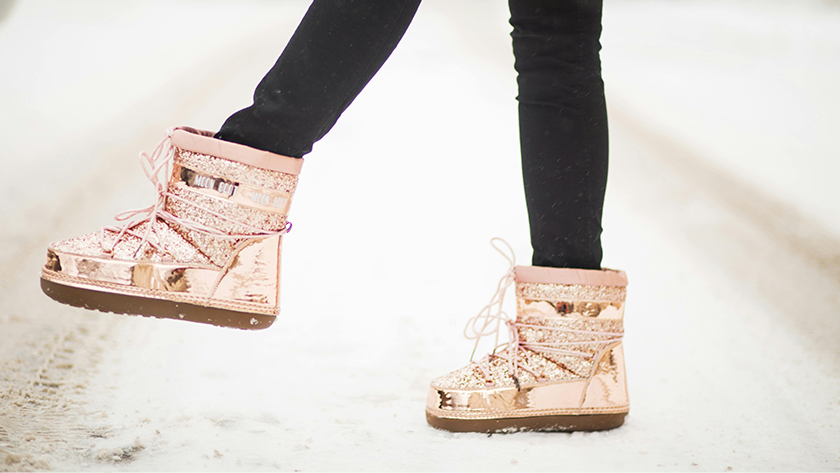
So verhindern Sie Fuß- und Nagelinfektionen im Winter: Wichtige Tipps für gesunde Füße
Winterwetter kann Füße stark belasten und Fuß- und Nagelinfektionen wie Fußpilz und Nagelpilz begünstigen. Kalte Temperaturen, mehrere Socken und geschlossene Schuhe führen oft zu Wärme- und Feuchtigkeitsstau, den Pilze lieben. Gesunde Füße und die Vorbeugung von Infektionen im Winter erfordern besondere Pflege. Hier finden Sie wichtige Tipps zur Vorbeugung von Fuß- und Nagelinfektionen und für gesunde Füße den ganzen Winter über.
1. Halten Sie Ihre Füße sauber und trocken
Eine der einfachsten Möglichkeiten, Fußinfektionen im Winter vorzubeugen, ist gute Hygiene. Auch wenn es kalt ist, können Füße schwitzen, besonders in warmen Socken und Stiefeln. So bleiben Ihre Füße sauber und trocken:
- Waschen Sie die Füße täglich mit warmem Wasser und milder Seife.
- Trocknen Sie die Zehen gründlich ab und achten Sie dabei besonders auf die Bereiche zwischen den Zehen, in denen sich häufig Feuchtigkeit sammelt.
- Wenn Ihre Füße stark schwitzen, sollten Sie ein Fußdeospray verwenden, um sie den ganzen Tag über trocken zu halten.
2. Wählen Sie atmungsaktive Socken und Schuhe
Es ist zwar verlockend, im Winter die dicksten Socken zu tragen, aber diese können manchmal überschüssige Feuchtigkeit einschließen und so das Risiko von Pilzbefall erhöhen. Stattdessen:
- Entscheiden Sie sich für feuchtigkeitsableitende Socken aus Wolle, Bambus oder synthetischen Materialien, die Feuchtigkeit von der Haut wegleiten.
- Wechseln Sie die Socken täglich und öfter, wenn Ihre Füße feucht werden.
- Wählen Sie Stiefel und Schuhe aus atmungsaktiven Materialien und guter Isolierung , um die Füße warm und trocken zu halten.
3. Lassen Sie Ihre Schuhe vollständig trocknen
Das Tragen feuchter oder nasser Schuhe ist eines der größten Risiken für Fuß- und Nagelinfektionen. Schnee, Regen und Matsch können es schwierig machen, Schuhe trocken zu halten. Sie können das Feuchtigkeitsrisiko jedoch reduzieren, indem Sie:
- Wechseln Sie zwischen den Schuhpaaren, um jedem Paar Zeit zum Trocknen zu geben.
- Einlegesohlen herausnehmen und Schuhe auslüften lassen.
- Stopfen Sie Ihre Schuhe mit Zeitungspapier aus oder verwenden Sie einen Schuhtrockner, um den Trocknungsprozess zu beschleunigen.
- Vermeiden Sie es nach Möglichkeit, zwei Tage hintereinander dasselbe Paar Schuhe zu tragen.
4. Nägel richtig schneiden
Das richtige Schneiden der Zehennägel kann das Risiko von Pilzinfektionen verringern, da kurze, gepflegte Nägel weniger anfällig für Risse sind, in die Pilze eindringen können. So schneiden Sie Ihre Zehennägel sicher:
- Schneiden Sie die Nägel gerade ab, um eingewachsene Zehennägel zu vermeiden, die schmerzhaft sein und zu Infektionen führen können.
- Halten Sie Ihre Nägel kurz und glatt, um raue Kanten zu vermeiden, die an Socken hängen bleiben und Bakterien Schutz bieten können.
- Verwenden Sie einen sauberen und desinfizierten Nagelknipser und teilen Sie Nagelwerkzeuge nicht mit anderen.
5. Vermeiden Sie es, in Gemeinschaftsbereichen barfuß zu laufen
Obwohl Barfußlaufen im Winter nicht so üblich ist, können einige Innenräume wie Fitnessstudios, Umkleideräume und sogar Spas Brutstätten für Pilze sein, die Fußpilz und Nagelinfektionen verursachen. Immer:
- Tragen Sie in Gemeinschaftsbereichen Flip-Flops oder Badeschuhe , auch wenn diese sauber erscheinen.
- Desinfizieren Sie Ihre Schuhe regelmäßig mit dem Schuh- und Sockenspray , da Pilze auf Schuhen verbleiben und sich ausbreiten können.
6. Intelligent befeuchten
Wintertrockenheit kann zu rissiger Haut führen, die anfälliger für Infektionen ist. Übermäßige Feuchtigkeitspflege oder die Verwendung von Produkten, die die Haut übermäßig nässen, kann jedoch das Risiko von Pilzbefall erhöhen. Für optimale Ergebnisse:
- Verwenden Sie eine nicht fettende Feuchtigkeitscreme und tragen Sie diese nur auf die Ober- und Unterseite Ihrer Füße auf. Vermeiden Sie dabei die Bereiche zwischen Ihren Zehen.
- Wenn Sie bereits Fußpilz hatten, spendet der Foot Balm Green Feuchtigkeit und schützt vor Pilzinfektionen.
7. Tragen Sie geeignetes Schuhwerk für Winteraktivitäten
Egal, ob Sie Wintersport betreiben oder einfach nur draußen sind – das richtige Schuhwerk ist entscheidend, um Infektionen vorzubeugen. Wasserdichte, isolierte und gut sitzende Winterstiefel halten Ihre Füße trocken und vor Feuchtigkeit geschützt, wodurch das Infektionsrisiko verringert wird. Beachten Sie:
- Wählen Sie Stiefel mit guter Passform, um Reibung oder Scheuern zu vermeiden, die zu Wunden oder Blasen führen können.
- Achten Sie darauf, dass das Schuhwerk wasserdicht ist, um nasse Füße bei Schnee oder Matsch zu vermeiden.
- Entscheiden Sie sich für isolierte Schuhe , um die Füße warm zu halten, ohne zusätzliche Socken anzuziehen, die das Schwitzen verstärken können.
8. Überwachen Sie Ihre Füße auf frühe Anzeichen einer Infektion
Winterschuhe verbergen oft unsere Füße, sodass frühe Symptome von Fuß- oder Nagelinfektionen leicht übersehen werden. Regelmäßiges Kontrollieren Ihrer Füße kann helfen, Probleme frühzeitig zu erkennen. Achten Sie auf:
- Rötung, Juckreiz oder Schuppenbildung der Haut , insbesondere zwischen den Zehen (frühe Anzeichen von Fußpilz).
- Verfärbung, Verdickung oder Brüchigkeit der Nägel , was auf eine Nagelpilzinfektion hinweisen könnte.
- Wunden oder Blasen , die nicht heilen oder infiziert aussehen.
9. Fördern Sie die Fußgesundheit mit einer ausgewogenen Ernährung
Auch wenn es scheinbar nichts damit zu tun hat, ist ein gesundes Immunsystem die beste Abwehr Ihres Körpers gegen Infektionen, auch an Füßen und Nägeln. Lebensmittel, die reich an Vitaminen und Mineralstoffen wie Vitamin C, Zink und Probiotika sind, tragen dazu bei, Haut und Nägel gesund und widerstandsfähig zu halten.
- Blattgemüse , das reich an Vitaminen und Antioxidantien ist
- Nüsse und Samen für gesunde Fette und Mineralien
- Joghurt und fermentierte Lebensmittel mit Probiotika zur Unterstützung der Immungesundheit können die allgemeine Hautgesundheit verbessern und die Wahrscheinlichkeit von Infektionen verringern.
10. Behandeln Sie alle Anzeichen von Fußpilz und Nagelpilz sofort
Da sich Fußpilz leicht auf die Zehennägel ausbreiten und zu einer Nagelpilzinfektion entwickeln kann, ist eine schnelle Behandlung unerlässlich, insbesondere im Winter, wenn die Füße oft in engen Räumen untergebracht sind. Anwendung:
- Die Lösung gegen Fußpilz ist reich an Aloe Vera und Mandelöl und heilt die Infektion, sodass die Haut weicher und gepflegter wird.
- Nagelmykose-Lösung mit Glycerin und Teebaumöl heilt die Zehen innerhalb weniger Wochen und verhindert das Wachstum des Pilzes.
Befolgen Sie diese Tipps, und Ihre Füße sind bereit, die Wintermonate bequem und gesund zu überstehen!







